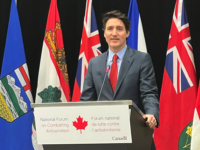Government and law enforcement justifications for warrantless access to Internet subscriber information has long been defended on the grounds that the information being demanded carries little privacy interest. The go-to claim was always that it was “phone book information”, a reference to the largely discontinued practice of printing an annual public directory that included name, address, and phone number. The problem with that argument was that the information at issue included data points such as IP addresses and device identifiers, which could be used to track users and monitor online activity without a warrant. Moreover, linking a specific user to a specific IP address or other identifier effectively unlocks the door to potentially very sensitive information that is otherwise unavailable. Indeed, there is a reason that law enforcement logged over a million warrantless requests per year for basic subscriber information prior to the Supreme Court shutting down the practice.
News
Privacy At Risk: Government Buries Lawful Access Provisions in New Border Bill
The government yesterday introduced the Strong Border Act (Bill C-2), legislation that was promoted as establishing new border measure provisions presumably designed to address U.S. concerns regarding the border. Yet buried toward the end of the bill are lawful access provisions that have nothing to do with the border. Those provisions, which raise the prospect of warrantless access to information about Internet subscribers, establish new global production orders of subscriber information, and envision new levels of access to data held by electronic service providers, mark the latest attempt in a longstanding campaign by Canadian law enforcement for lawful access legislation. Stymied by the Supreme Court of Canada (which has ruled that there is a reasonable expectation of privacy in subscriber data) and by repeated failures to present a compelling evidentiary case for warrantless access, law enforcement has instead tried to frame lawful access as essential to address everything from organized crime to cyber-bullying to (now) border safety. Much like the government’s overreach last year on online harms, Bill C-2 overreaches by including measures on Internet subscriber data that have nothing to do with border safety or security but raise privacy and civil liberties concerns that are bound to spark opposition. This post provides the background on lawful access and an overview of some Bill C-2’s provisions with more details on key elements to come.
Here We Go Again: Internet Age Verification and Website Blocking Bill Reintroduced in the Senate (With Some Changes)
The last Parliament featured debate over several contentious Internet-related bills, notably streaming and news laws (Bills C-11 and C-18), online harms (Bill C-63) and Internet age verification and website blocking (Bill S-210). Bill S-210 fell below the radar screen for many months as it started in the Senate and received only cursory review in the House. The bill faced only a final vote in the House but it died with the election call. This week, the bill’s sponsor, Senator Julie Miville-Dechêne, wasted no time in bringing it back. Now Bill S-209, the bill starts from scratch in the Senate with the same basic framework but with some notable changes that address at least some of the concerns raised by the prior bill (a fulsome review of those concerns can be heard in a Law Bytes podcast I conducted with Senator Miville-Dechêne).
Queen’s University Trustees Reject Divestment Efforts Emphasizing the Importance of Institutional Neutrality
The Queen’s University Board of Trustees last week rejected efforts to require divestment of the university’s endowment and investment funds from companies conducting business with or in the State of Israel and declined to implement a negative screening process for future investments. The decision, which adopted a review committee’s assessment, stands as one of the more detailed analysis of the issue at a Canadian university. Some universities have declined to even consider the possibility and others have held open hearings on the issue. But Queen’s agreed to full committee review, sparking consultations and numerous submissions.
The review committee’s report identifies several reasons to reject the divestment proposals including fiduciary obligations that require that the University’s investments be managed prudently with a view to maximizing financial returns, the lack of consensus on the political issues, and the acknowledged ineffectiveness of divestment policies. The report also notably relies on the importance of institutional neutrality in reaching its decision.
When Words Fail: Reflections on the National Forum on Combatting Antisemitism
I was pleased to attend the National Forum on Combatting Antisemitism in Ottawa yesterday. It is easy to be cynical: the event came at least a year late, even reassuring words of support (Prime Minister Justin Trudeau again declared that “no one in Canada should be afraid to call themselves a Zionist. I am a Zionist”) lose their impact when action repeatedly does not align with those words, and the absence of Conservative MPs made the event more political than needed. Further, I remain skeptical that everyone is ready for the hard action of implementing and enforcing antisemitism standards in schools, universities, and workplaces as well as consistently applying the anti-hate laws already on the books.











